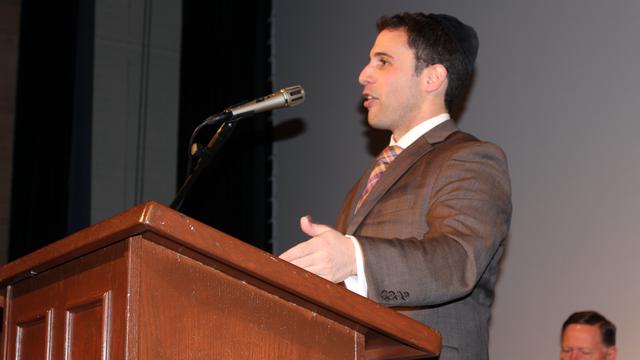“Our political life can be improved through emulating family life,” Dr. Daniel Mark told a gathering at Brigham Young University in Provo, Utah, Thursday. Dr. Mark is an expert on religious freedom and political science assistant professor at Villanova University.
“Defending religious freedom, now more than ever, depends on promoting what I’ll call the family ethic in society,” Mark told students and faculty in the Wilkinson Student Center’s crowded Varsity Theater.

Mark is an Orthodox Jew and a member of the U.S. Commission on International Religious Freedom. His lecture was titled “What Politics Can Learn from the Family: Jews, Latter-day Saints and the Case for Religious Freedom.”
“I think America needs a family home evening. American families need family home evening, but I mean a family night for society,” said Mark.
The Church implemented the family home evening program more than 100 years ago to build and strengthen families.
“The key, I think, like with family home evening, is for people to spend quality time together. This is why a vibrant civic culture, complete with neighborhood picnics and rec leagues and volunteer associations, is so important. There is much truth to the cliché that if only people got to know each other, they would respect each other much more,” he said.
Mark continued, “My aim is not to prescribe a specific plan, but to suggest that we must redouble our efforts to engage our fellow citizens intentionally outside of the contentious political arena and the impersonal marketplace. Latter-day Saints are probably better at this than most.”
“The family cannot survive if everyone stands on his rights all the time. There can be no family life without mercy,” explained Mark. “Individual liberty is incredibly valuable, but it can also erode the bonds of community.”
Mark said that religious liberty rights must be “robustly respected and vigorously defended,” but he also quoted an October address given by Elder Dallin H. Oaks of the Quorum of the Twelve Apostles, who said that “we should not assert the free exercise of religion to override every law and government action that could possibly be interpreted to infringe on institutional or personal religious freedom.”
“Cultivating a family ethic is especially difficult, but commensurately important, when it comes to religion and religious freedom,” Mark added. “As traditional religious values become increasingly unpopular, we must refrain from playing into the narrative that what we are doing is wrong though protected.”
“The family is not just an example for society; the family is also the primary building block of society. The family is the first place where children learn the virtue necessary to be good citizens,” emphasized Mark.
He concluded, “So let us take example from The Church of Jesus Christ of Latter-day Saints and from the Jews. Your task is, first, to build strong families that sustain our republic by producing responsible citizens and by serving as models for the rest of society — and, second, to carry the family ethic out into the world. Family home evening: coming to a neighborhood near you. This certainly will require religious freedom, but, done well, it will also foster a society that honors religious freedom.”
While in Utah, Mark met with leaders of The Church of Jesus Christ of Latter-day Saints in Salt Lake City and Provo. He toured the Church’s Humanitarian Center and Welfare Square facilities and visited the Provo City Center Temple prior to its public open house.
Mark recently participated in the Humanum Colloquium in Rome and the World Meeting of Families in Philadelphia.